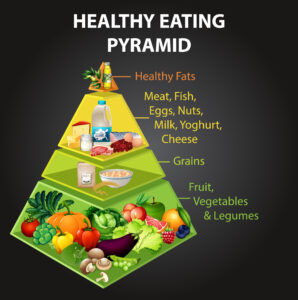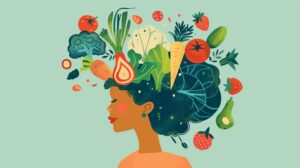We Are What We Eat Understanding the Impact of Diet on Our Lives
The phrase “We are what we eat” has a deep-rooted significance, illustrating how the food we consume shapes not just our physical bodies but also our mental health, energy levels, and overall well-being. The food choices we make every day directly affect how our bodies function, how we feel, and even how we think. From nutrients and calorie intake to the environmental and cultural factors that influence our diet, the way we eat plays a pivotal role in shaping our identity.
1. Nutritional Science: The Building Blocks of Health

Food provides essential nutrients—proteins, carbohydrates, fats, vitamins, and minerals—that act as the building blocks of life. Each nutrient plays a specific role in our body:
- Proteins are essential for building and repairing tissues.
- Carbohydrates serve as the body’s main source of energy.
- Fats regulate hormones, support brain health, and provide long-term energy storage.
- Vitamins and minerals support a wide range of functions, from immune health to bone strength.
If our diet lacks any of these essential components, it can lead to deficiencies that affect everything from immune function to cognitive performance. For example, vitamin D deficiency can lead to weakened bones, while lack of iron can result in anemia, leading to fatigue and decreased productivity.
2. Mental Health and Diet

Our diet doesn’t just influence our physical health; it also has a profound impact on our mental health. Studies have shown that certain dietary patterns can affect mood, behavior, and cognitive function. For example, a diet rich in processed foods, sugars, and unhealthy fats has been linked to higher rates of depression and anxiety. On the other hand, diets rich in fruits, vegetables, whole grains, and omega-3 fatty acids (found in fish) are associated with better mental health outcomes.
A balanced diet provides the brain with the necessary nutrients to produce neurotransmitters like serotonin and dopamine, which play critical roles in regulating mood and emotion. This connection is particularly evident in the Mediterranean diet, which is rich in vegetables, fish, and olive oil, and has been associated with reduced risks of depression and cognitive decline.
3. “You Are What You Eat” on a Cultural and Social Level
What we eat also reflects cultural, ethical, and societal values. Diets are often influenced by traditions, beliefs, and geography. For example, in many Asian cultures, rice and vegetables form the foundation of daily meals, while in Mediterranean regions, olive oil, fish, and grains are staples. In this sense, our diet is a reflection of our cultural identity.
Additionally, ethical choices—such as vegetarianism or veganism—often arise from a desire to live in harmony with one’s values, whether related to animal welfare, environmental sustainability, or health reasons. For example, choosing a plant-based diet can reduce one’s carbon footprint, as meat production is resource-intensive and contributes to greenhouse gas emissions.
4. The Impact of Processed Foods

Modern diets often contain large amounts of processed foods, which are high in sugars, unhealthy fats, and preservatives. These foods provide little nutritional value and have been linked to a host of health problems, including obesity, diabetes, heart disease, and metabolic syndrome.
Example: Consider fast food. While convenient, it is typically high in trans fats, salt, and sugar, which can lead to an array of health issues if consumed frequently. A diet high in such foods can increase inflammation in the body, lead to insulin resistance, and promote weight gain—all of which elevate the risk of chronic disease.
In contrast, consuming whole foods—such as fruits, vegetables, whole grains, and lean proteins—provides nutrients that the body uses efficiently. The fiber in whole foods also supports digestive health and can help regulate blood sugar levels, preventing chronic conditions like Type 2 diabetes.
5. Gut Health and Immunity

The health of the gut microbiome—an ecosystem of trillions of bacteria in the digestive system—plays a critical role in both digestion and immune function. A diet high in processed foods and sugars can disrupt the balance of gut bacteria, leading to problems like leaky gut syndrome, inflammation, and weakened immunity. Conversely, diets rich in fiber, prebiotics (found in foods like onions, garlic, and bananas), and probiotics (found in fermented foods like yogurt and kimchi) support gut health and overall immunity.
6. The Role of Diet in Longevity

Numerous studies have highlighted how diet affects longevity. The people living in “Blue Zones”, such as Okinawa in Japan and Sardinia in Italy, have some of the highest life expectancies in the world. Their diets are characterized by low meat consumption, high intake of vegetables, legumes, and whole grains, and moderate alcohol consumption. This diet, combined with a strong sense of community and regular physical activity, contributes to their long, healthy lives.
Conclusion: Choosing the Right Diet

We truly are what we eat. The foods we consume directly impact our physical and mental health, and by extension, our quality of life. By choosing nutrient-rich, whole foods over processed, high-sugar options, we can fuel our bodies for optimal health and well-being. Additionally, making mindful decisions about our diet allows us to align our eating habits with our personal values and cultural identity, while contributing to a healthier planet.
In the end, being conscious of what we eat isn’t just about staying fit—it’s about living a life full of vitality, purpose, and health.






